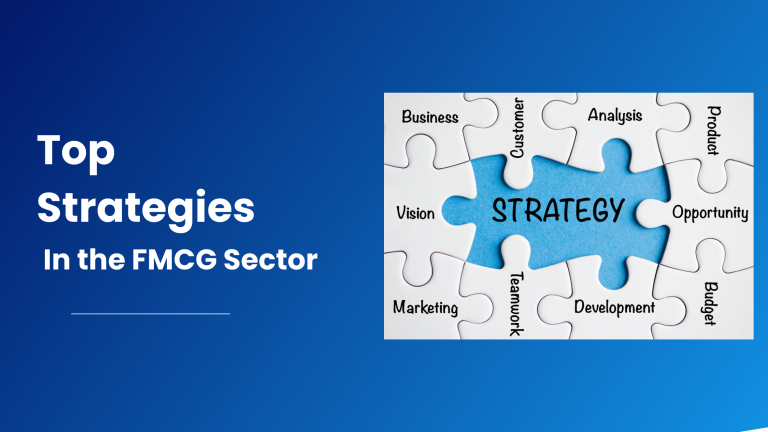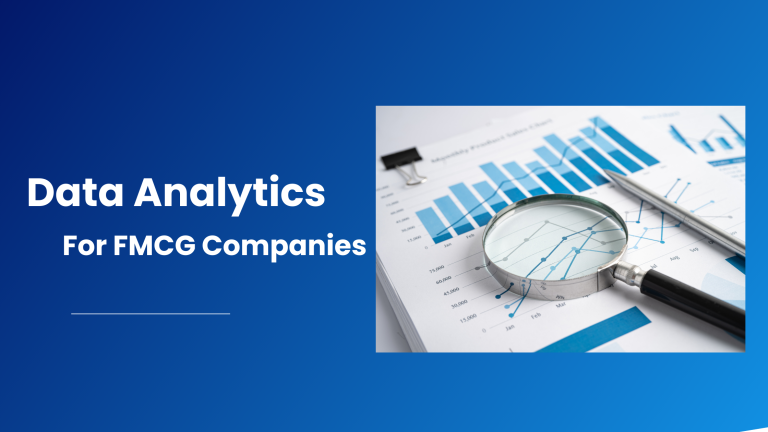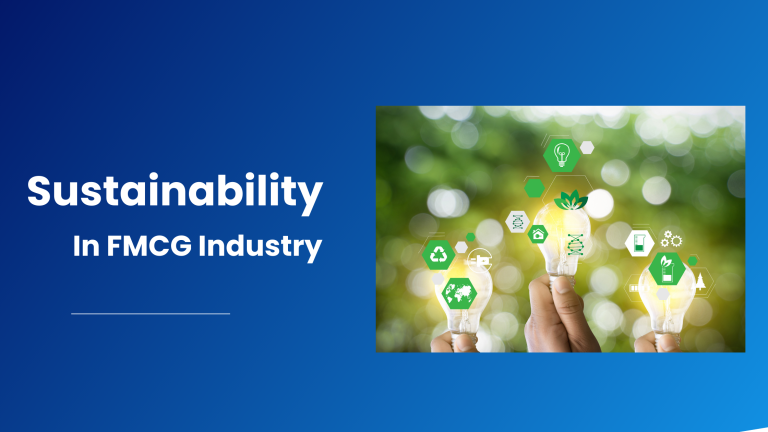When you enter a convenience store, you see many daily-use products placed on different store shelves. Sometimes, the product you’re searching for isn’t available. It’s because these products are sold quickly.
But now the question is, what is the common link between all these products, and what industry do they collectively represent?
These are all fast-moving consumer goods (FMCG) and fall under the FMCG industry. FMCG is a dynamic sector that significantly contributes to the country’s economic growth by producing a large number of employment opportunities every year.
This brief overview only scratches the surface of the FMCG industry. Now, let’s delve deeper into the details of the FMCG industry and its various aspects.
What are FMCG Products?
FMCG, or Fast-Moving Consumer Goods, products are everyday essentials and are always in high demand among people due to higher consumption and cheaper rates. These products are sold out quickly, and stores need to regularly stock up on these items to meet consumer needs.
FMCG products include:
- Groceries: bread, milk, and eggs
- Home cleaning products: disinfectant spray, floor cleaner, and bathroom cleaner
- Beverages: soft drinks, bottled water, and packed juices
- Processed food: cheese, oats, and pasta
- Cosmetics: hair care products, makeup products, and grooming products
- Toiletries: soap, shampoo, and tissue paper
- Stationeries: pen, notebook, and markers

Key business strategies in the FMCG sector
In the FMCG sector, businesses use several strategies to stay competitive and successful in the ever-changing dynamics.
1. Market penetration
It is a strategy to boost product visibility and awareness among consumers through different advertising channels like TV, online platforms, and social media. This strategy also focuses on increasing the customer base by implementing price strategies like discounts, promotional offers, or selling the products at a price lower than the selling price.
2. Product Differentiation
The main focus of product differentiation is to make the product stand out from the competitors by emphasizing its benefits and features. FMCG companies focus on improving product quality, adding additional features and benefits to the product, or creating distinctive packaging to influence the customers’ choices and persuade them to choose their products over their competitors.
Current Trends in FMCG
In recent years, the FMCG industry has experienced a significant shift in its customer interaction and product sales strategies. Let’s explore the current FMCG trends one by one:
1. Rise of E-Commerce and Digital Platforms
One of the biggest trends in the FMCG sector right now is the rise of e-commerce and digital platforms. This trend has changed the shopping habits of people, as they prefer shopping online more than visiting stores. With the rise in digital platforms like Amazon, Flipkart, and Walmart, shoppers can scroll, choose, and place product orders from the comfort of their homes. This ongoing trend is reshaping how FMCG products are marketed and sold to the consumer, making it mandatory for FMCG companies to innovate their marketing strategies and build an online presence to reach their potential customers.
2. Shift towards health and wellness products
The growing health awareness and lifestyle changes have increased customers’ interest in health and wellness products. People are becoming more health-conscious and continuously making lifestyle changes, which has significantly increased the demand for products promoting healthier lifestyles like organic foods, low-sugar snacks, and natural personal care items.
3. Increasing demand for sustainable and ethical products
Consumers are increasingly concerned about the environmental and social impact of their purchases, which is raising demand for sustainable and ethical products in the FMCG sector. More consumers are looking for products with eco-friendly packaging that are made in a way that respects ethical standards like fair labor practices and cruelty-free testing.

Innovations Driving the FMCG Industry
Innovations in the FMCG industry are transforming how products are made, packaged, and personalized. Let’s learn about FMCG innovations in detail:
1. Technological advancements in production and supply chain
New technologies are transforming how FMCG products are made and delivered. Automated machinery and smart systems are speeding up production processes and improving efficiency. Innovations like real-time data tracking help companies manage their supply chains better, ensuring products are available when and where they’re needed.
2. Innovations in Packaging and Product Design
Innovations in packaging and product design are making FMCG products more functional, attractive, and sustainable to use for their customers. FMCG companies are increasingly adopting modern packaging like easy-to-open designs, resealable closures, and eco-friendly materials for their products to differentiate themselves from their competitors.
3. Personalization and Customization of Consumer Experiences
Personalization and customization are transforming the consumer experience in the FMCG industry. Companies are now leveraging data analytics to offer recommendations and create products to match individual tastes and preferences. This is helping businesses build strong relationships with customers, in turn building a loyal customer base and increasing product sales.

How do FMCG companies use data analytics?
FMCG companies are increasingly using data analytics to improve their operations and connect with customers. Here’s how:
1. Leveraging big data for consumer insights
FMCG companies collect data from various sources, like social media and customer reviews, to understand consumer preferences, buying habits, and trends. This data helps FMCG companies identify what products are popular among consumers, the features they like, and the marketing messages that resonate with them. Using the collected data, companies update their products and marketing strategies to meet customer needs and improve their experience with the products offered.
2. Predictive Analytics for Demand Forecasting
FMCG companies use predictive analytics to forecast future trends of the products and customers’ purchasing behavior. FMCG companies analyze historical sales data, market trends, and other relevant information to predict which products will be in high demand and when. These data and insights help businesses manage inventory levels to avoid unstocking and overstocking to reduce wastage and ensure customer needs are met timely.
3. Enhancing Customer Engagement Through Data-Driven Strategies
FMCG companies use data-driven strategies to enhance customer engagement. They analyze data on consumer preferences and purchase history to create targeted marketing campaigns and personalized product recommendations. These data also help companies understand which marketing channels are most effective and which promotion strategies resonate with their audience.

Why is sustainability important in FMCGs?
Sustainability plays a significant role in the FMCG industry to build brand loyalty among consumers.
1. Eco-friendly practices and initiatives
FMCG companies are adopting eco-friendly practices like using recycled materials, reducing waste, conserving energy, and cutting down on pollution to minimize environmental impact. Many consumers are increasingly concerned about the environment and prefer brands that show a commitment to eco-friendly practices. Thus, the FMCG industry is contributing to a healthier planet by protecting natural resources and minimizing pollution produced by their factory.
2. The Impact of Sustainability on Brand Loyalty
People today are more aware of the environmental and ethical impact of their purchases and would stay loyal to brands that align with their values and practice sustainability over the brands that waste resources and primarily focus on selling their products. FMCG companies are continuously practicing sustainability to gain trust and customer loyalty for continuous business.
3. Case studies of successful sustainable FMCG brands
Here we have discussed the case studies of some famous FMCG brands:
Unilever:
Unilever is a global leader in consumer goods. They have implemented a sustainable living plan and have committed to sourcing 100% of their agricultural raw materials sustainably. Unilever’s commitment to sustainability has strengthened its brand reputation and increased consumer trust, which has helped them attract and retain customers who prioritize eco-friendly practices.
The Body Shop:
The Body Shop is a major cosmetics and personal care brand committed to sourcing ingredients sustainably and against animal testing. They develop cruelty-free products and are continuously working to reduce their plastic footprint by using more recycled materials in packaging.

What challenges do FMCG companies face today?
While FMCG industry products are quickly sold out, they do face some major challenges that we will discuss in this section:
1. Navigating Supply Chain Disruptions
FMCG companies’ supply chain network includes suppliers, wholesalers, retailers, and customers. If an FMCG company faces a problem with any one of them, their whole supply chain would be disrupted. Also, there are other factors such as natural disasters, political instability, global events, or regulatory changes that are unpredictable and affect the supply chain to a major extent.
2. Addressing Changing Consumer Preferences
Consumer tastes and preferences are continuously evolving. They are becoming more health-conscious, environmentally aware, and interested in unique or personalized products. FMCG companies must be updated with the current trends and customers’ interests in products and continuously optimize their product features, benefits, and marketing strategies to stay ahead of their competitors.
3. Opportunities for Growth in Emerging Markets
Emerging markets present both challenges and opportunities for FMCG companies and are found in developing countries, creating new opportunities for FMCG companies to expand their reach and grow their sales. However, companies must navigate different regulatory environments, understand local consumer behavior, and build distribution networks to enter these markets.
Future Outlook of the FMCG Industry
1. Predicted Trends and Innovations
The future of the FMCG industry is set to be shaped by several key trends and innovations.
FMCG Trends:
- Increased consumption of health and wellness products like organic foods and wellness supplements.
- More consumers focus on brands practicing eco-friendly packaging to reduce waste and plastic footprints.
- Rise of e-commerce platforms due to changing shopping habits.
FMCG Innovations:
- More focus on innovating product ingredients and packaging for environment and health-conscious consumers.
- Adopting modern packaging techniques to provide product information through QR codes and sensors, improving customer shopping and product tracking experience.
Conclusion
FMCG industry products are sold at low prices and have a high turnover. Due to its rapid consumption, stores have to ensure to restock these products to meet their customers’ needs. FMCG companies must be updated with current trends like e-commerce platforms and changes in customer preferences to stay ahead of their competitors. They should adopt new technologies in their production and supply chain and leverage data analytics to collect, understand, and analyze customer preferences towards different products to optimize production and marketing strategies. However, improving product features to attract customers is not much applicable in today’s market, as brands need to practice eco-friendly packaging and other measures to attract and retain customers.
